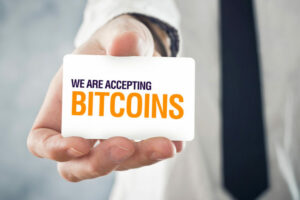How To Start Using Bitcoin

 You’ve learned what Bitcoin is and how it works. So now, why not actually start using bitcoins? It’s incredibly easy to send and receive BTC, and this guide will show you how to get setup as a regular Bitcoin user or a Bitcoin merchant. Let’s get started.
You’ve learned what Bitcoin is and how it works. So now, why not actually start using bitcoins? It’s incredibly easy to send and receive BTC, and this guide will show you how to get setup as a regular Bitcoin user or a Bitcoin merchant. Let’s get started.
Learn how to buy bitcoins here.
Your Bitcoin Wallet
As with all forms of currency, you need a place to keep your money. With traditional (fiat) currency, most people keep a small amount of money in a wallet or purse while keeping the rest of their savings at the bank. Let’s see how to do something similar with bitcoins. While there are many different ways to store bitcoins, this guide will examine some of the easiest methods for new users.
In simplest terms, bitcoins are stored in digital wallets. A Bitcoin wallet is simply a piece of software that can store, send, and receive BTC. However, there are many different wallets to choose from, each with its own pros and cons. Regardless of what you choose, it’s a good idea to keep two wallets – one for spending and one for your savings. Bitcoin doesn’t rely on financial institutions like banks, and instead, users have complete control over their money. While this might sound like a huge responsibility, this guide aims to show how easy it is to be your own bank.
Your Spending (Hot) Bitcoin Wallet
Your first wallet will be used for day to day transactions, similar to the physical wallet in your pocket or purse. This type of wallet is also sometimes referred to as a “hot wallet,” meaning that it is connected to the Internet. One very popular and easy to use hot wallet is Blockchain.info , a wallet that can conveniently be accessed from anywhere in the world on any device as long as you’re connected to the Internet. To start using Blockchain, simply navigate to this page , and create an account. In just a few simple steps, you’ll have your own Bitcoin wallet!
Notice the QR code on the left and the text next to it. This is your Bitcoin address. If anyone wants to send you money, they send it to your unique address. If you want to send someone money, you go to the “Send Money” tab and enter that person’s address and the amount of bitcoins you want to send. It’s that easy.
You may have noticed something interesting. You are encouraged to share your Bitcoin address. A Bitcoin address doesn’t need to be kept private and protected the way a credit card number does. Instead, a Bitcoin address functions much like a mailing address. Anyone can send you mail, but only you have the key to access the mail in your mailbox. Similarly, anyone can send bitcoins to your address, but only you have access to the coins you receive.
Compare this to a credit card number or a debit card number.If you want to make a transaction, you have to give the merchant total access to your funds, and trust that he/she will only withdraw the amount authorized. But with Bitcoin, you send the money rather than having the merchant take the money from your wallet. As you will see, Bitcoin eliminates the need to trust third parties (although in some instances it can be convenient to trust one), and is in many ways a lot safer than traditional money.
Speaking of third parties, is Blockchain safe? The short answer is, yes. Blockchain’s source code is available for anyone to examine, meaning that users can be sure that the service isn’t doing anything suspicious behind the scenes. Furthermore, Blockchain does not have access to users’ private keys and is considered sufficiently secure by most in the Bitcoin community. Of course, for the truly paranoid, you could download a desktop wallet client such as Bitcoin Core or Electrum. Since the software would be on your own computer rather than Blockchain’s servers, it could be considered more secure. However, the downside would be that your wallet would only be accessible from your computer. Services like Blockchain provide both convenience and reasonably good security, which is important for an everyday wallet.
Your Savings (Cold) Bitcoin Wallet
Now this is where you want to make as few compromises as possible regarding security. Your savings wallet will be similar to your savings account at the bank. Since you’ll be keeping most of your bitcoins here, you’ll want to use the best possible security. One of the ways to achieve this is by making your savings wallet a “cold wallet,” meaning that it’s not connected to the Internet. By remaining offline, a cold wallet is far less vulnerable to hackers. A very easy to use cold storage solution is Coinbase Vault.

Without getting into the technical details, the way the Vault works is that Coinbase stores your bitcoins offline in various secure locations around the globe. Withdrawing coins from the Vault requires multiple layers of verification, and withdrawals are time-delayed by 48 hours, meaning the transaction can be cancelled during that 48-hour window. Coinbase has been independently audited by trusted members of the community, and is used by prominent companies such as Dell, Expedia, and DISH Network.
But of course, as mentioned above, you don’t need to trust a third party like Coinbase. It just might be more convenient, especially for newer users. To truly be your own bank, you can generate a paper wallet or use an offline hardware wallet . But these are beyond the scope of this guide.
Using Your Bitcoins
So you’ve got your wallets set up. Now it’s time to start using those bitcoins! If you don’t have any BTC, you can buy some from a Bitcoin exchange. There are also some free ways to get bitcoins. But of course, the most basic feature of money is that it can be used to buy things. So where can you actually spend bitcoins? The list might surprise you:
Companies That Accept Bitcoins
1-800-Flowers
CheapAir
Dell
DISH Network
Expedia
Fancy
Namecheap
Newegg
Overstock
ProtonMail
Shopify
The Humble Bundle
TigerDirect
Twitch.tv
Wikipedia
Wordpress
– and so many others.
Furthermore, services like Gyft allow users to purchase gift cards for various stores with Bitcoin. This essentially allows users to use bitcoins at Amazon, Target, and other retailers that don’t yet accept Bitcoin payments. As Bitcoin continues to gain traction, undoubtedly more and more companies will start accepting Bitcoin payments as Bitcoin provides a secure and easy way to transmit money online.
How to Accept Bitcoins For Merchants?
Perhaps you’ve got your own business and are interested in accepting Bitcoin payments? If that’s the case, services like Coinbase and BitPay make it incredibly easy for merchants to accept bitcoins. Depending on how popular your business is, you’ll see little to no fees for accepting bitcoins (and the fees will always be less than those of fiat payment processors like PayPal).
All in all, it’s both easy and advantageous to start using Bitcoin. Hopefully this guide will help you get set up. And if you have any questions, feel free to leave them in the comments.
Disclaimer: The third party services mentioned in this article, including, but not limited to, Coinbase, Blockchain, Gyft, etc. are used purely as examples. The use of the above-mentioned services should not be considered an endorsement from CCN. CCN cannot guarantee the continued availability of these services nor does CCN accept any responsibility for any loss, including financial loss, incurred as a result of using the above-mentioned services. While we’re fairly confident about the legitimacy of these services, you are urged to do your own research.
Images from Shutterstock.
Last modified (UTC): December 17, 2017 4:45 AM
